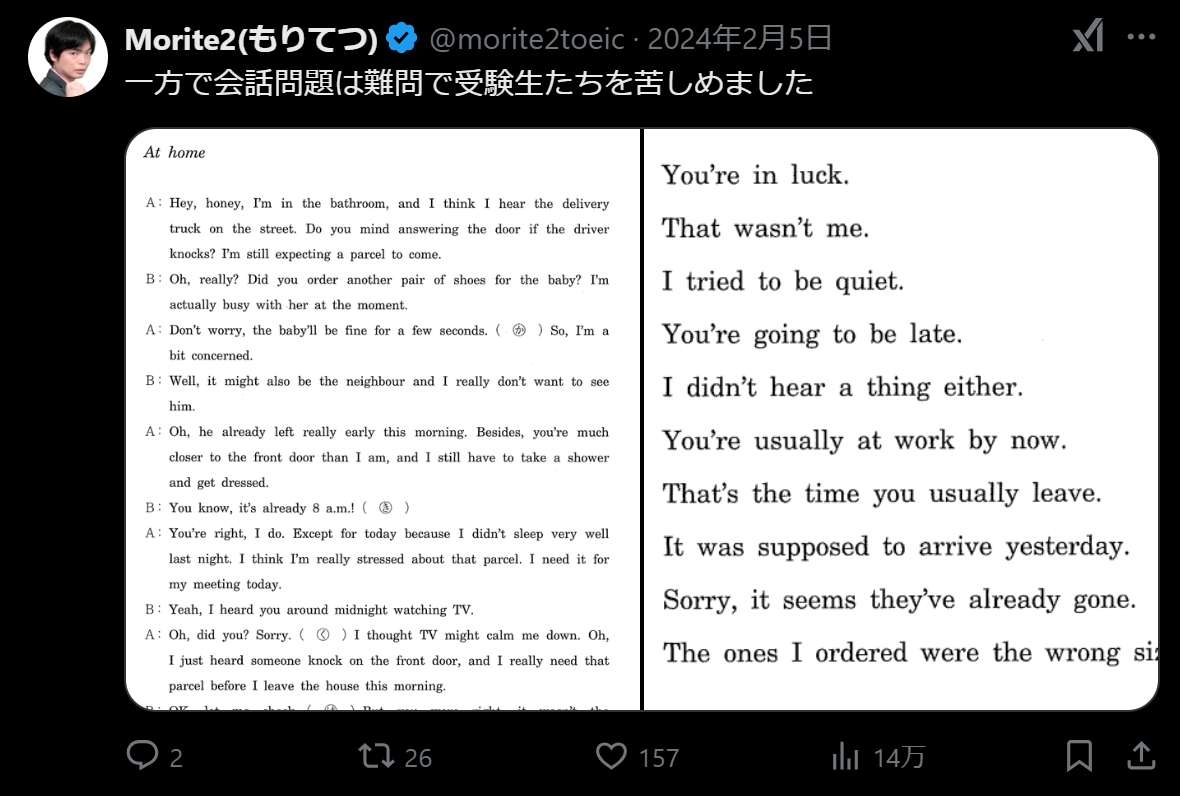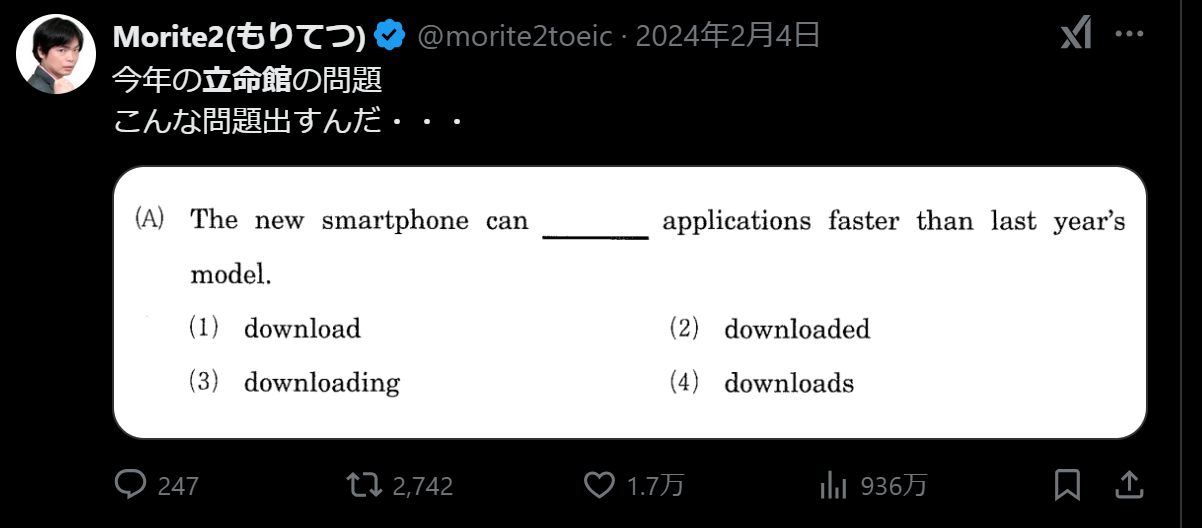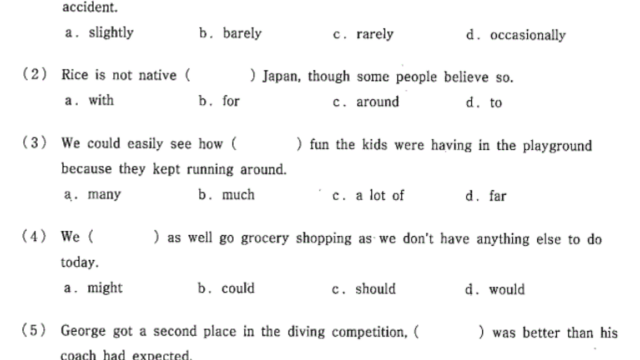
「こんな問題出すんだ・・・」(「こんな問題」=助動詞canのあとに動詞を入れるという、中学生でもわかるような問題という意味かな?)から早一年、2025年立命館大学の全学部(文系)の問題が入試速報サイトにあがっていました!今年の問題はどうだったでしょうか?また「こんな問題・・・」が出てきたのか、興味深いところですね!早速見ていきましょう!※もっとも、もりてつさんは、この直後のツイートで、「会話問題は受験生たちを苦しめました」としっかりとフォローしています^^;

<問題を見た感想>
「こんな問題」レヴェルの問題はありませんでしたが、どの問題も普段から高校の授業をしっかりと受けていれば難なく答えられるものばかりです!強いてあげれば
(C) How _____ can the child jump?
(1) height (2) high (3) highest (4) highly
これは恐らく受験生の9割以上は解けたのではないかと思います!
学校の授業第一!これを再認識させられる問題です!
IV 次の(A)〜(H)それぞれの文を完成させるのに、下線部の語法としてもっとも適当なものを(1)〜(4)から一つ選び、その番号を解答欄にマークしなさい。
(A) Your trip to those tropical islands _____ fun.
(1) sound (2) sounding (3) sounding like (4) sounds(B) I saw _____ number of birds fly to the south.
(1) a (2) large (3) the (4) which(C) How _____ can the child jump?
(1) height (2) high (3) highest (4) highly(D) My uncle sees a doctor once every _____.
(1) a month (2) often (3) other (4) two weeks(E) The cable is 500 yen _____.
(1) a meter (2) meter (3) meter’s (4) meters(F) Tom didn’t call me, _____ did Jane.
(1) nor (2) so (3) then (4) yet(G) The actor hurt in the accident _____ again in less than a week.
(1) badly (2) luckily (3) perform (4) walked(H) The new employee was made _____ to the main office to apologize.
(1) go (2) going (3) gone (4) to go
【解答一覧】
(A) (4) sounds
(B) (1) a
(C) (2) high
(D) (4) two weeks
(E) (1) a meter
(F) (1) nor
(G) (4) walked
(H) (4) to go
原田英語特製!解答&解説
(A) Your trip to those tropical islands _____ fun.
正解: (4) sounds
解説:
- 「Your trip ~ sounds fun.」は「(あなたの旅行は)楽しそうに思える」という意味。
- “sound + 形容詞” で「~に思える/聞こえる」を表す。
例文:
Your plan to visit Hawaii sounds fun.
和訳:
「ハワイへ行く計画は楽しそうですね。」
(B) I saw _____ number of birds fly to the south.
正解: (1) a
解説:
- 「a number of + 可算名詞(複数)」は「多くの~/いくつかの~」という意味。
- 「I saw a number of birds fly to the south.」=「私は多くの鳥が南へ飛んでいくのを見ました。」
- (2) large を入れて “large number of birds” にするには、本来 “a large number of birds” の形が必要になるが、空所は 1 つだけのため (2) は不適。
例文:
A number of guests arrived at the party at the same time.
和訳:
「たくさんの来客が同時にパーティーに到着しました。」
(C) How _____ can the child jump?
正解: (2) high
解説:
- “How high can the child jump?” で「その子どもはどのくらい高く跳べますか」という意味。
- “height” は名詞、“highest” は最上級の形容詞、“highly” は「非常に」の副詞で文意に合わない。
例文:
How high can your dog jump over that fence?
和訳:
「あなたの犬はあの柵をどのくらいの高さまで飛び越えられますか?」
(D) My uncle sees a doctor once every _____.
正解: (4) two weeks
解説:
- 「once every two weeks」で「2 週間に 1 度」という意味。
- (1) a month なら「月に 1 度」で文意が変わる。 (2) often, (3) other は文法的に合わない。
例文:
My mother visits her parents once every two weeks.
和訳:
「母は 2 週間に 1 度、祖父母のところへ行きます。」
(E) The cable is 500 yen _____.
正解: (1) a meter
解説:
- 「The cable is 500 yen a meter」で「このケーブルは1メートルあたり 500 円だ」という意味。
- 物の単価を表すときによく使う表現 “~ per ~” と同様に “~ a ~” が使われる。
例文:
These apples are 300 yen a bag.
和訳:
「これらのリンゴは 1 袋 300 円です。」
(F) Tom didn’t call me, _____ did Jane.
正解: (1) nor
解説:
- 「Tom didn’t call me, nor did Jane.」=「トムも電話してこなかったし、ジェーンも電話してこなかった。」
- “nor” は「~もまた…ない」を表す接続詞で、倒置形 “nor + 助動詞/動詞 + 主語” で使われる。
例文:
I didn’t see the film, nor did I read any reviews about it.
和訳:
「私はその映画を観ていないし、レビューもまったく読んでいません。」
(G) The actor hurt in the accident _____ again in less than a week.
正解: (4) walked
解説:
- 受傷した役者が「1 週間も経たないうちにふたたび歩けるようになった」という文脈。“walked again” が自然。
- (3) perform だと本来 “performed” が必要で、選択肢にない。 (1) badly, (2) luckily は副詞で文意に合わない。
例文:
The injured athlete walked again in just three days after the accident.
和訳:
「そのけがをした運動選手は、事故のわずか 3 日後にまた歩けるようになりました。」
(H) The new employee was made _____ to the main office to apologize.
正解: (4) to go
解説:
- 「make + 目的語 + 動詞の原形」は「(目的語)に (動詞)させる」の意味だが、受け身になると “be made + to 不定詞” の形を取る。
- 「The new employee was made to go to the main office」=「新入社員は本社へ行くようにさせられた」。
例文:
He was made to apologize in front of the entire staff.
和訳:
「彼は全スタッフの前で謝罪させられました。」








